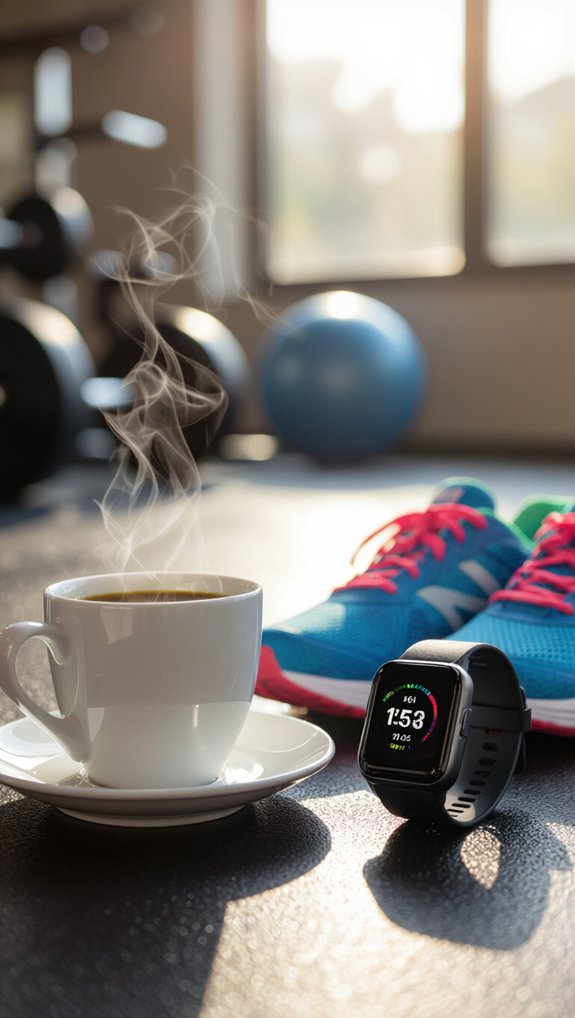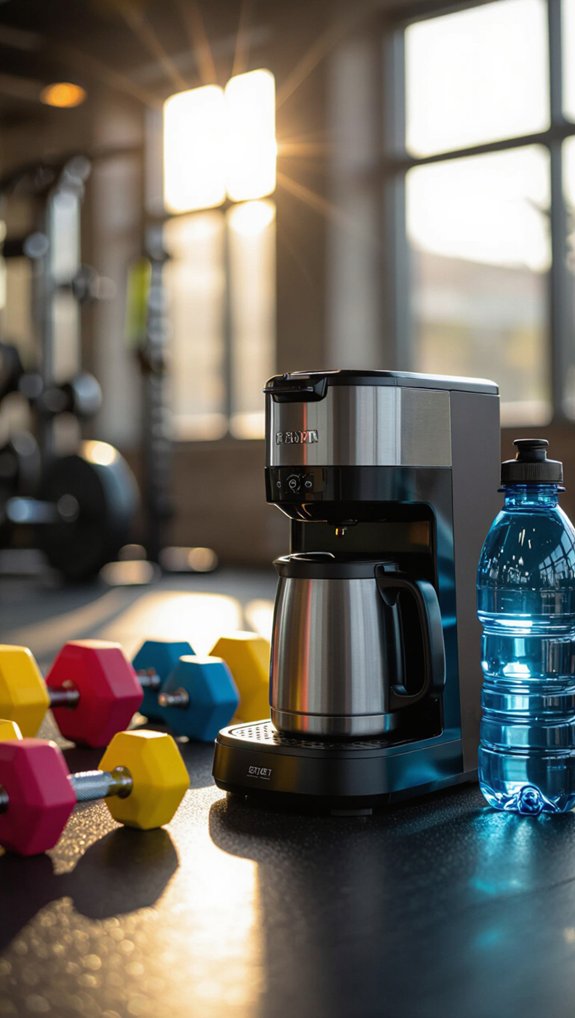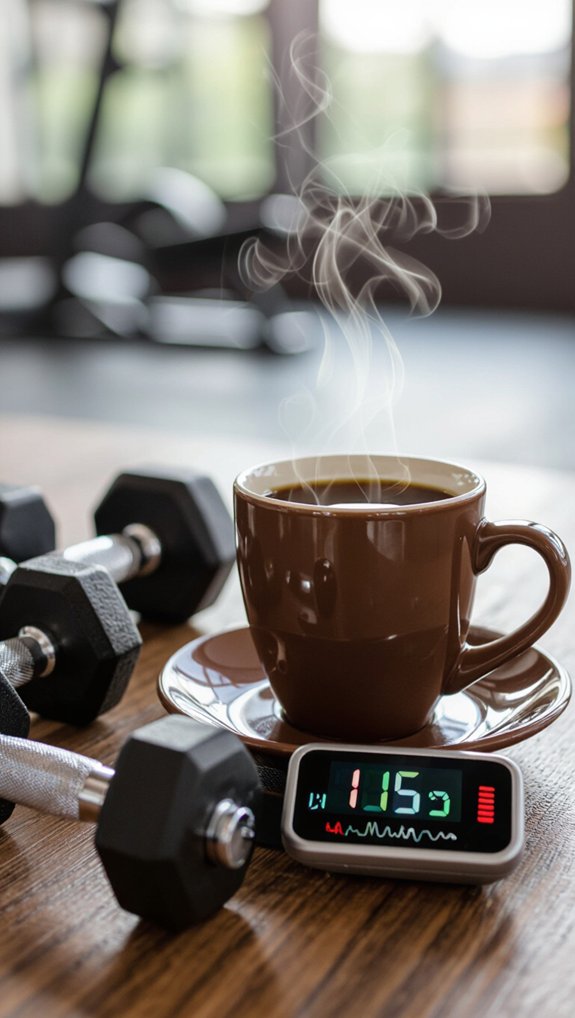Wondering if that pre-workout cup of coffee actually makes a difference, or if you’re just fooling yourself? You’re not alone-countless fitness enthusiasts debate whether caffeine truly enhances performance or simply provides a psychological boost. The truth is, caffeine can be a legitimate game-changer for your workouts, but only when used strategically.
Most people treat caffeine as nothing more than an energy drink, missing out on its incredible potential to improve endurance, strength, and focus during exercise. The science behind caffeine’s performance benefits is fascinating, involving everything from fat oxidation to pain perception.
In this post, we’ll explore exactly how caffeine affects your body during exercise, the optimal timing and dosage for maximum benefits, and which types of workouts see the biggest improvements. You’ll also discover the potential downsides and learn how to avoid common mistakes that could sabotage your results.
Table of Contents
What Happens When You Mix Caffeine and Exercise

Powering through a workout with caffeine can transform your exercise experience.
By consuming a strategic caffeine dose (3–6 mg/kg), you’ll boost endurance performance and reduce perceived exertion through adenosine receptor antagonism.
The magic happens when you time your ingestion 30–60 minutes pre-workout, whether through coffee, capsules, or caffeinated gum.
You’ll notice reduced muscle fatigue and potentially improved power during sprints.
However, be mindful of side effects like jitters and increased heart rate, especially if you’re not a habitual caffeine user.
Individual responses vary, so start low and listen to your body’s performance signals.
How Caffeine Affects Your Workout

Caffeine can dramatically transform your workout performance, acting as a powerful ergogenic aid that goes far beyond simple energy boost.
A strategic caffeine dose of 3–6 mg/kg can revolutionize your exercise experience through:
- Enhanced endurance performance
- Reduced perceived exertion
- Improved central nervous system alertness
Best Time to Take Caffeine Before Exercise

Strategically timing your caffeine intake can make or break your workout performance.
When it comes to pre-exercise caffeine timing, you’ll want to aim for that sweet spot: 30–60 minutes before your workout. I recommend a dose of 3–6 mg/kg for optimal endurance performance.
Insider hint: If you’re using caffeinated gum, you can take it closer to exercise start due to faster buccal absorption. Traditional coffee or capsules need about 60 minutes to reach peak plasma levels.
Just be mindful of potential side effects and avoid late-day dosing to prevent sleep disruption. Test your timing during training first!
Caffeine’s Impact on Endurance and Strength

If you’re looking to boost your athletic performance, caffeine’s got your back with some serious scientific cred.
You’ll find that moderate caffeine doses can dramatically improve endurance performance, reduce perceived exertion, and even enhance power output during high-intensity exercises.
From helping you push through that last mile to increasing your mean power in resistance training, caffeine is proving to be a powerful ally for athletes across different disciplines.
Boosting endurance
Unlock your athletic potential with caffeine’s powerful endurance-boosting properties. Trained athletes can leverage precise caffeine dosage to enhance time-trial performance and rating of perceived exertion (RPE). Consider these endurance-enhancing strategies:
- Consume 3–6 mg per kg of caffeine 30–60 minutes pre-exercise
- Target 200–400 mg for optimal ergogenic effect
- Factor in your CYP1A2 genotype for personalized response
Fat oxidation increases during exercise, particularly for untrained individuals. While long-term weight loss isn’t guaranteed, endurance performance can improve by 2–11%.
Cycling studies demonstrate that adding 100–200 mg caffeine to carbohydrate drinks significantly accelerates completion times, making it a strategic performance enhancer.
Power and strength effects
Power your workout with caffeine’s emerging potential to boost strength and explosive performance. At a caffeine dose of 3–6 mg/kg, you’ll see improvements in power output and vertical jump height. Trained athletes especially benefit from this ergogenic boost, experiencing enhanced bench‑press throw velocities and explosive power.
While maximal strength results vary, strategic timing matters. Consuming 200–400 mg about 30–60 minutes pre‑exercise can optimize performance. Just be cautious-doses above 9 mg/kg increase side effects without additional benefits. Bottom line: caffeine might just be your workout’s secret weapon.
High-intensity exercise
When diving into high-intensity exercise performance, caffeine emerges as a fascinating ergogenic aid that can dramatically influence your workout. At the right caffeine dose (3–6 mg/kg), you’ll experience remarkable benefits:
- Reduced perceived exertion (RPE)
- Extended time-to-exhaustion
- Enhanced muscle power/motor-unit output
Through adenosine receptor antagonism, caffeine can lower pain perception and boost sprint performance. However, habitual caffeine use might blunt these effects, so strategic consumption is key.
Opt for fast-delivery methods like chewing gum for quicker uptake. Be mindful of potential side effects such as insomnia or GI distress, and start with moderate doses around 150–200 mg to assess your tolerance.
Does Caffeine Help With Fat Burning?

Exploring caffeine’s fat-burning potential reveals a fascinating interplay between this popular stimulant and metabolic processes. Caffeine triggers lipolysis and thermogenesis, helping mobilize stored fat during exercise. Individual responses vary based on genetic factors and habitual consumption.
| Caffeine Aspect | Effect | Impact |
|---|---|---|
| Dose (mg/kg) | 3-7 | Fat Oxidation |
| Timing | 30-60 min pre-exercise | Performance |
| Genetic Variation | CYP1A2 | Metabolism Rate |
| Exercise Type | High-intensity | Fat Burning |
| Consumption Form | Coffee/Supplements | Metabolic Response |
While promising, caffeine’s fat-burning benefits aren’t a magic weight loss solution. It can boost exercise performance and fat oxidation, but long-term weight loss requires comprehensive lifestyle strategies.
How Much Caffeine Is Safe for Exercise?

Comprehending how much caffeine you can safely consume before exercise requires balancing performance benefits with potential health risks.
The optimal ergogenic dose typically ranges from 3–6 mg per kg of body weight, which translates to about 200–400 mg pre-exercise.
Consider these caffeine consumption guidelines:
- Start with a lower dose (150–200 mg) to assess individual tolerance
- Avoid exceeding 400 mg to prevent unnecessary side effects
- Time intake 30–60 minutes before activity for peak performance
Certain individuals-like those with hypertension or anxiety disorders-should consult a clinician before using performance-focused caffeine doses to mitigate potential health risks.
Side Effects to Watch Out For

Although caffeine can boost athletic performance, it’s crucial to recognize potential side effects that might derail your workout or health.
Consuming high doses (>600 mg) can trigger caffeine side effects like increased heart rate, jitteriness, tremors, and sleep disruption.
Depending on your dose (mg/kg), you might experience anxiety, insomnia, or gastrointestinal discomfort.
Those with high blood pressure, heart conditions, or anxiety disorders should be especially cautious.
Watch for warning signs like persistent restlessness or stomach issues.
If you’re sensitive, start with lower amounts and monitor how your body responds during exercise.
Tips for Using Caffeine in Your Fitness Routine

Many fitness enthusiasts strategically incorporate caffeine into their training regimen to enhance performance and mental focus.
When optimizing your pre-workout routine, consider these key strategies:
- Start with a low caffeine dose (150–200 mg) and test tolerance before scaling up to 3–6 mg per kg body weight.
- Time your intake 30–60 minutes before exercise, using caffeinated gum for faster absorption if needed.
- Manage habitual intake to prevent blunting performance benefits, cycling usage to maintain sensitivity.
Monitor potential side effects like jitters and insomnia, and choose delivery methods that support your endurance performance and muscle strength goals.
Frequently Asked Questions
Does Caffeine Affect Workouts?
Yes, caffeine boosts my workout performance! It helps me feel more alert, reduces fatigue, and lets me push harder during exercise. I’ve noticed increased endurance and power when I take the right dose before training.
Why Do Athletes Avoid Caffeine?
I avoid caffeine before competitions because it can trigger anxiety, disrupt my sleep, cause tremors, and potentially impair my performance. Its side effects might compromise my precision and physical readiness during critical athletic moments.
Does Caffeine Burn off During Exercise?
No, caffeine doesn’t burn off during exercise. It’s metabolized in the liver, not consumed by muscles. Its effects, like increased alertness and reduced perceived effort, persist throughout your workout, typically lasting 4-6 hours after ingestion.
Will Exercise Flush Out Caffeine?
No, I won’t flush out caffeine through exercise. My workout might boost alertness, but it won’t speed up caffeine metabolism. The liver breaks down caffeine at its own rate, regardless of my physical activity.
In Conclusion
If you’re looking to boost your workout, caffeine can be your secret weapon. I’ve found that when used strategically, it enhances performance, increases fat burning, and helps you push through tough training sessions. Just remember to start low, listen to your body, and be mindful of potential side effects. By grasping how caffeine works with exercise, you’ll maximize its benefits and minimize risks. Your fitness journey just got a caffeinated upgrade!








